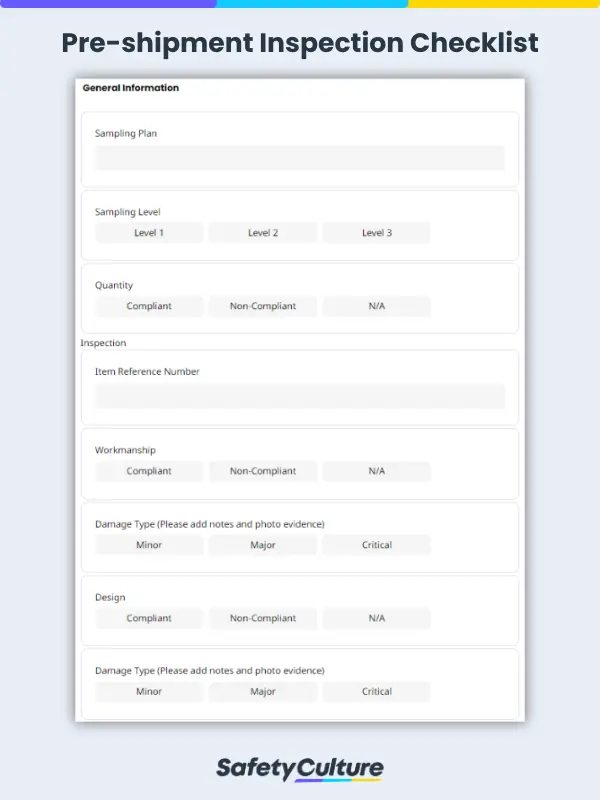What is a Pre-shipment Inspection?
A pre-shipment inspection is a systematic process in which newly manufactured products are evaluated based on compliance with client specifications, regulatory standards, and purchase orders before import and export shipments. Thorough pre-shipment inspections are paramount in several industries including manufacturing and retail to avoid costly import risks, substandard products, and product recalls.
Importance of a Pre-shipment Inspection
A pre-shipment inspection helps secure the quality of products to increase customer satisfaction and retention. It is performed to ensure the following:
- Comply with business product designs and requirements;
- Reduce risks for importing or exporting low-quality goods;
- Rectify damaged goods immediately;
- Prevent product delays due to overlooked items;
- Protect business confidentiality; and
- Foster proper communication for improvement needs.
What is a Pre-shipment Inspection Checklist?
A pre-shipment inspection checklist is used by QA inspectors to evaluate the condition and conformity of products according to agreed business standards. It is used to identify product defects, damages, and the overall negative test result including safety and quality.
This article features the following: 1) 5 Important items you should not miss during pre-shipment inspection; 2) 7 steps to effectively perform pre-shipment inspections; 3) how can a mobile-ready app helps you to streamline your pre-shipment inspections; and 4) free, ready-to-use templates to help pre-shipment inspections easy.
5 Important Items You Should Not Miss During Pre-shipment Inspection
Pre-shipment inspections guarantee the quality of goods or products before they are shipped for delivery. They are an important part of the quality control process where random items should be checked accordingly. Here are the important items that you should not miss during the pre-shipment inspection:
- Restricted chemicals
A product that contains restricted chemicals may be advised for further off-site lab testing. This would ensure environmental and public health safety. - Incorrect quantity
Meeting customers’ specifications for orders is an important element of pre-shipment inspection checks. This will help establish business credibility by meeting quantity demand without sacrificing deadlines. Check the package and verify the correct number of products and boxes and ensure it will be sent to its proper destination. - Visible defects on finished products
Producing high-quality goods are the topmost priority of every business. Visually inspect the overall appearance of a product and thoroughly check according to product detail including materials used, design, and branding. - Failed function and safety test
Product functionality and working condition are vital to your business. Each item should pass product testing to validate its purpose, suitability of design, and usage for end-user satisfaction. Failure to check product specifications such as electrical or mechanical functions could cause potential risks and customer incidents. - Incorrect labeling
Labeling is one of the most neglected items in the manufacturing industry. Apparently, it is one of the most important factors when shipping your products. Labels represent the information or symbols about the product. It communicates product contents (e.g. hazardous, perishable, or fragile), transport style, quantity, and location of origin and destination of products. Unable to provide informative details can lead to lost or mishandled items causing bad customer experience, damaged items, or losing business sales.
7 Steps to Effectively Perform Pre-shipment Inspections
A pre-shipment inspection is a crucial task that aims to improve international trade standards.
It is performed by quality assurance inspectors to evaluate product compliance with agreed specifications. Inconsistent pre-shipment inspection due to overlooked processes can lead to product return, business reputation damage or worse business closure. To avoid unnecessary incidents, here are 7 simple steps to effectively perform pre-shipment inspections:
- Factory visits
You can start the pre-shipment inspection when production reaches 80% of the target. This will give enough room to fix any defects and damages found during the inspection. - Quantity checks
Check the timeline and validate customer specifications if you are reaching deadlines. Record the number of packages or products and ensure it matches on customer’s order forms. - Selection of samples
Follow the ANSI/ASQ Z1.4 (ISO 2859-1) for a statistical sampling procedure. Select random samples from finished goods and assess depending on inspection levels. - Visual inspections
Assess the overall visual appearance of a product using the naked eye and check for visual defects or damages. Evaluate if the number of defects in a batch is beyond the Acceptance Quality Limit (AQL) before you reject the product. - Safety tests
Test product functionality and ensure it is operational and in good working condition. Evaluate if it passes product safety standards including constructional specifications, performance, and approved laboratory testing. - Compliance checks
Verify if deliverables met the standards set out in your quality plans. Check if finished goods correspond to customer’s requirements including package, labels, tags, manual, and quantity. - Utilize pre-shipment inspection checklist
A pre-shipment inspection checklist is a tool used to guide quality assurance inspectors in documenting their analysis and observations about the products. It helps in gathering results if the business meets customer quality requirements and specifications.



